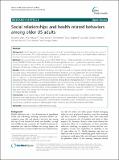| dc.contributor.author | Watt, Richard G | en_US |
| dc.contributor.author | Heilmann, Anja | en_US |
| dc.contributor.author | Sabbah, Wael | en_US |
| dc.contributor.author | Newton, Tim | en_US |
| dc.contributor.author | Chandola, Tarani | en_US |
| dc.contributor.author | Aida, Jun | en_US |
| dc.contributor.author | Sheiham, Aubrey | en_US |
| dc.contributor.author | Marmot, Michael | en_US |
| dc.contributor.author | Kawachi, Ichiro | en_US |
| dc.contributor.author | Tsakos, Georgios | en_US |
| dc.date.accessioned | 2014-07-07T17:01:41Z | |
| dc.date.issued | 2014 | en_US |
| dc.identifier.citation | Watt, Richard G, Anja Heilmann, Wael Sabbah, Tim Newton, Tarani Chandola, Jun Aida, Aubrey Sheiham, Michael Marmot, Ichiro Kawachi, and Georgios Tsakos. 2014. “Social relationships and health related behaviors among older US adults.” BMC Public Health 14 (1): 533. doi:10.1186/1471-2458-14-533. http://dx.doi.org/10.1186/1471-2458-14-533. | en |
| dc.identifier.issn | 1471-2458 | en |
| dc.identifier.uri | http://nrs.harvard.edu/urn-3:HUL.InstRepos:12406544 | |
| dc.description.abstract | Background: Health behaviors are a key determinant of health and well-being that are influenced by the nature of the social environment. This study examined associations between social relationships and health-related behaviors among a nationally representative sample of older people. Methods: We analyzed data from three waves (1999–2004) of the US National Health and Nutrition Examination Survey (NHANES). Participants were 4,014 older Americans aged 60 and over. Log-binomial regression models estimated prevalence ratios (PR) for the associations between social relationships and each of the following health behaviors: alcohol use, smoking, physical activity and dental attendance. Results: Health-compromising behaviors (smoking, heavy drinking and less frequent dental visits) were related to marital status, while physical activity, a health-promoting behavior, was associated with the size of friendship networks. Smoking was more common among divorced/separated (PR = 2.1; 95% CI: 1.6, 2.7) and widowed (PR = 1.7; 95% CI: 1.3, 2.3) respondents than among those married or cohabiting, after adjusting for socio-demographic background. Heavy drinking was 2.6 times more common among divorced/separated and 1.7 times more common among widowed men compared to married/cohabiting men, while there was no such association among women. For women, heavy drinking was associated with being single (PR = 1.7; 95% CI: 1.0, 2.9). Being widowed was related to a lower prevalence of having visited a dentist compared to being married or living with a partner (PR = 0.92; 95% CI 0.86, 0.99). Those with a larger circle of friends were more likely to be physically active (PR = 1.17; 95% CI:1.06, 1.28 for 5–8 versus less than 5 friends). Conclusions: Social relationships of older Americans were independently associated with different health-related behaviors, even after adjusting for demographic and socioeconomic determinants. Availability of emotional support did not however mediate these associations. More research is needed to assess if strengthening social relationships would have a significant impact on older people’s health behaviors and ultimately improve their health. | en |
| dc.language.iso | en_US | en |
| dc.publisher | BioMed Central | en |
| dc.relation.isversionof | doi:10.1186/1471-2458-14-533 | en |
| dc.relation.hasversion | http://www.ncbi.nlm.nih.gov/pmc/articles/PMC4046043/pdf/ | en |
| dash.license | LAA | en_US |
| dc.subject | Social relationships | en |
| dc.subject | Health behaviors | en |
| dc.subject | Aging | en |
| dc.title | Social relationships and health related behaviors among older US adults | en |
| dc.type | Journal Article | en_US |
| dc.description.version | Version of Record | en |
| dc.relation.journal | BMC Public Health | en |
| dash.depositing.author | Kawachi, Ichiro | en_US |
| dc.date.available | 2014-07-07T17:01:41Z | |
| dc.identifier.doi | 10.1186/1471-2458-14-533 | * |
| dash.contributor.affiliated | Kawachi, Ichiro | |


